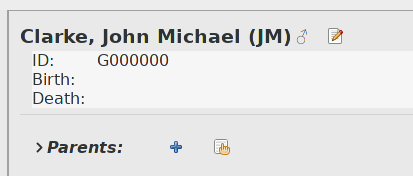I’ve been hacking on the Gramps Python files in order to do some tweaks on the detailed descendant report. It has been more or less smooth sailing, but now I’m facing a tougher puzzle. I would like to insert _AKA names into the displayed names in the report, when they exist.
I know they are stored in the NICKNAME attribute (when the _AKA name consists of a single name) when imported (I import GEDCOM data coming from Webtrees).
The name displaying functionality is so highly optimised that I’m having trouble figuring out how to tackle it. My understanding so far is that I would need to achieve the following:
- Smuggle a person object into gramps/name.py at maintenance/gramps51 · gramps-project/gramps · GitHub so I can call its get_attribute_list()
- Add an %a for aka into the dictionary in _gen_raw_func() (line 600)
- Use the %a in Name.LNFN in gramps/name.py at maintenance/gramps51 · gramps-project/gramps · GitHub
What would be the best way to get the person object in that context, for starters?




